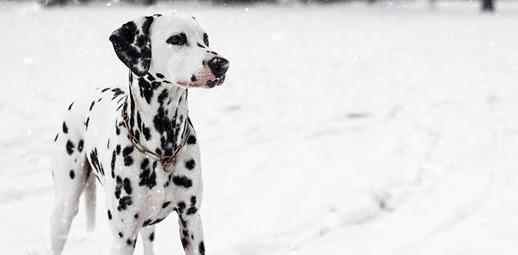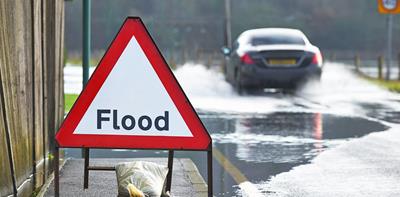
Your pet may have fur but that doesn’t mean it’ll be warm and cosy all through winter. In fact, when the cold weather hits, your furry friend is likely to need extra care and attention to ensure it stays safe and well, especially if it’s older or if conditions are particularly brutal.
Here are some simple tips and reminders to help keep your cat, dog or other pet safe.
Provide a warm, cosy environment
No pet should be left outside for long periods if the temperature falls below freezing, so ensure your pet always has a warm, draft-free place to shelter and sleep on.
Don’t skip walks
It can be hard to relinquish the warmth of home on a cold, damp day. But if you have a dog, it will still need exercise. You might however consider shorter walks in freezing weather, so you and your dog don’t spend too much time exposed to the cold.
When out and about, avoid ice and frozen water. Your dog could slip and injure themselves - as could you.
On dark nights, make sure your dog is visible to passers-by and vehicles. You can do this by using a reflective collar or a small light attached to your dog’s collar.
If you have a cat and live near a busy road, a reflective collar may be a good idea all year round.
If your dog doesn’t want to venture out into the freezing cold, make sure they have toys to play with inside, so they still get some exercise.
Look after their feet
Your pet’s feet are especially vulnerable to the hazards associated with cold weather.
After taking a dog for a walk, or if your cat comes back from its outdoor ramblings, wash and dry their feet to get rid of any salt or chemicals and prevent any irritation.
Check your dog for cracked paw pads or bleeding, as these can indicate cold-weather injury or damage.
Adjust their food
Pets burn extra energy to stay warm in colder weather, so you may need to feed them a little more. On the flipside, if your pet is staying indoors because it’s too cold out, consider reducing their food portions so they don’t put on weight.
Don’t forget to provide plenty of fresh water, whatever the weather.
Time to get dressed
Consider whether your dog needs a coat or jumper to stay warm when out on winter walks, especially if they’re elderly, sick or a fine-coated dog, such as a Greyhound.
If you have a cat, much as cat clothing might look cute or amusing, your feline friend most likely won’t need a jumper, and could overheat if you put one on them.
Consider your cat
While cats don’t need wrapping up in woolly gear, don’t assume they’re OK just left to their own devices in cold weather.
In the coldest months it's important that your cat has access to a warm environment. If it’s really cold, you might have to keep even outdoor cats inside to avoid putting them at risk of hypothermia and frostbite. You’ll, of course, need a litter tray handy to do this.
If you suspect your pet has hypothermia or frostbite after prolonged exposure to the cold, then contact your vet immediately.
Collar and chip
Pets can get lost in winter as the scents they usually rely on may be hidden by snow and ice. Also, if they seek shelter in an outbuilding such as a shed, they may be harder to find in winter, as people are less likely to go into their sheds as frequently during this time of year.
Now is the time to ensure your pet can be identified should it get lost. One way is to put a collar on them, but this can be easily removed or lost. The most reliable way to do it is to make sure they’re microchipped, as the chip can be scanned, and they can then be reunited with you.
Watch out for winter poisons
Pet owners are always conscious of the risk of poisons to their animals, and winter can bring additional risks.
Antifreeze is toxic, so make sure you keep the container away somewhere safe and clean up any spills immediately.
Rock salt is another potential risk, so wash your pet’s paws well if they’ve been walking in areas that may have been gritted.
Your car
If you're driving somewhere on a cold winter morning, just take a quick look under and around your car, in case a cat – whether it’s yours or someone else’s – has sought shelter from the cold in a warm nook such as a wheel arch.
If taking your pets in the car, never leave them unattended. The risks of leaving a dog in a hot car in summer are well known, but the cold can also be lethal.
If you’re driving somewhere to take your pet for a walk, it’s a good idea to keep an old towel in the car so you can clean and dry their paws and fur. It will help them warm up and has the added benefit of keeping your car clean too.
Don’t forget other outdoor pets
You might assume the likes of rabbits and other outdoor pets can cope whatever the weather. But they may actually need extra bedding in winter months - you could also add a blanket to insulate their hutch as long as you make sure there is adequate ventilation. Alternatively, consider moving their enclosure into a shed or garage.
Finally, if you have a pond, the RSPCA advises you check it every day to make sure the surface is not entirely frozen. When ponds freeze, poisonous gases can build up under the ice. If your pond does freeze over, rather than smashing the ice, the charity recommends carefully putting a saucepan of hot water on the surface to gently melt a hole in it.

